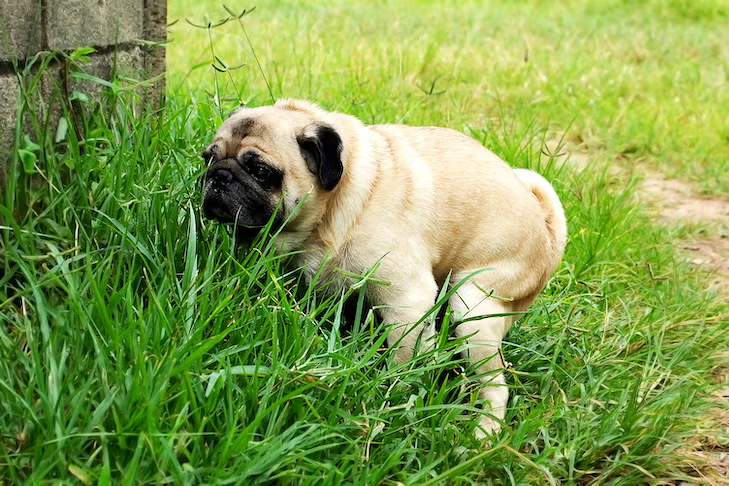You wake up to the sound of your dog pacing. Then that familiar scratch-scratch at the door. By the time you grab a leash and head outside, your pup is squatting on the grass, and what comes out is, well… not normal.
There’s diarrhea. And then there’s mucus-y diarrhea. Slimy, jelly-like stuff in the stool that instantly sets off alarm bells in your head. Is it serious? Is it just something they ate? Should you call the vet right now or wait it out?

What mucus in dog poop actually means
Let’s not sugarcoat it, seeing mucus in your dog’s poop is gross and worrying. But mucus isn’t always a bad sign on its own.
Dogs have mucus naturally in their intestines to help things move along. It’s when you see it that things start to get messy, literally and figuratively.
That slick layer of slime is often your dog’s gut saying, “Oi! Something’s off down here.” It’s a signal, not a diagnosis.
Possible causes
Dogs will eat just about anything, and their guts don’t always thank them for it. A sudden change in food? New treats? A cheeky bit of leftover curry they nicked off the counter? Yeah, all those can trigger mucus diarrhea.
Other times it’s more about what’s going on in their body, like intestinal parasites, stress, allergies, or infections. Even antibiotics or certain meds can mess with the gut and show up as mucus in the stool.
One dog got into a half-eaten chicken bone from the bin. Another had a sudden flare-up after their humans went on holiday. Stress, diet, germs, it’s all fair game.
When it’s time to call the vet (and not Google)
If it’s just a one-off episode and your dog is still bright-eyed, eating, and acting fairly normal, you might be okay waiting a bit. Keep an eye on them. Jot down what you see. Clean up the mess, curse softly, and take a breather.
But if the mucus diarrhea keeps coming, or it’s paired with:
- Vomiting
- Lethargy
- Refusal to eat or drink
- Blood in the stool
- Dehydration (dry gums, sunken eyes)
Then it’s time to call the vet. Don’t muck about waiting for things to magically sort themselves. A dodgy gut can spiral quickly.
What your vet will want to know (aka how to be helpful)
Before you make the call or show up at the clinic with a worried look and a dog in tow, it helps to gather some info:
- How long has the diarrhea been happening?
- Is it every poop or just once?
- Any vomiting or change in behavior?
- New food, treats, or table scraps recently?
- Any access to rubbish, spoiled food, or weird stuff outside?
And yep, if you can handle it, snapping a photo of the poop might actually help your vet. Not glamorous, but sometimes necessary.
What you can do at home for mild cases
If your dog seems otherwise okay and it’s the first slimy poop you’ve seen, you can try a few gentle things at home:
- Offer fresh water often
- Keep food bland, think plain boiled chicken and rice
- Avoid treats, table scraps, or anything rich or spicy
- Give their belly a break for 12 hours if they’re adult and healthy (puppies and older dogs shouldn’t fast without vet advice)
Some pet parents swear by pumpkin or probiotics, but check with your vet before adding anything. What helps one dog might not help another, and the goal is not to make things worse.
Don’t play vet if things look dicey
It’s tempting to go online and try to match symptoms or scroll through forums. But no two dogs are the same, and no blog post (not even this one) replaces proper vet care when things go sideways.
If your gut says, “This isn’t normal,” then trust that instinct. Especially if your dog starts acting off. Dogs are tough, but they also hide pain better than they should. By the time they show it, it’s often already serious.
A quick note on stressy pups
Not all mucus diarrhea comes from food or bugs. Dogs are emotional creatures. Big changes like moving house, a new baby, loud fireworks, or even missing their favorite human can set their gut into panic mode.
If your dog’s a sensitive soul, stress might be behind the runny trouble. Doesn’t mean it’s harmless, but it does mean the solution might include more snuggles than medicine.
Stuff to keep on hand (just in case)
If your dog has a sensitive stomach or tends to react to new things, it helps to be prepared. Not like a full-on emergency vet kit, but just the basics:
- A bland meal stash (frozen rice and boiled chicken can save the day)
- Doggy probiotics recommended by your vet
- A notebook or app to track symptoms
- Poop bags. Always more than you think you’ll need
Because let’s face it, these things never happen when it’s convenient.
Final thoughts for the worried dog parent
Mucus in your dog’s diarrhea doesn’t always mean disaster. But it’s worth paying attention to. Sometimes it’s a one-time thing. Other times it’s your dog waving a tiny red flag that something deeper is off.
No one likes cleaning up mystery slime at 6 a.m., especially not before coffee. But a little info, a quick call to your vet, and keeping things chill can go a long way.
At the end of the day, it’s about being tuned in. Knowing what’s normal for your dog, and not brushing off the weird stuff. So now that you’ve seen the gloop, what’s your next move?